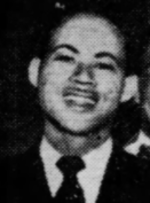 Plainfield Courier-News (AP) Convicted of murder and aggravated battery in Trenton, New Jersey, in 1948, James Thorpe was one of six young black men (now known as the Trenton Six) who were sentenced to death for the murder of a shop keeper and the assault on his wife, Elizabeth. A jury acquitted Thorpe of all charges three and a half years later when the confession he gave was proven to be false. On January 27, 1948, William Horner, a 72-year-old Caucasian man, who was a junk shop keeper, was killed and his common-law wife was beaten in Trenton, New Jersey. Horner died after being hit on the head with a soda bottle. His wife was not certain about the number of men actually involved in the attack, only that there were two to four light-skinned black teenagers. The motive appeared to be robbery, although the police found over $1,500 on Horner’s person. The Trenton police, criticized for being soft on crime, were pressured to solve the case, so on February 11, 1948, they arrested six black males—Ralph Cooper, age 24, Collis English, age 23, McKinley Forrest, age 35, John McKenzie, age 24, James Thorpe, age 24, and Horace Wilson, age 37, without warrants, held them without access to attorneys, and questioned them for four days. All but one of the suspects signed confessions, which were obtained by police coercion. When the trial began on June 7, 1948, there was no forensic evidence, no eyewitness identification, and all six defendants had solid alibis. They also repudiated the confessions they had signed, saying they had been threatened and deprived of sleep for days. There was something peculiar about these confessions that made their validity questionable. English had a history of saying whatever someone wanted to hear. Forrest’s signed confession was proven to be faulty by the discovery of a receipt from Horner’s store a week before the murder. The receipt showed that he had signed his name with an “X” because he was illiterate. Wilson had work logs to prove he was in Robbinsville the morning of the murder. Eight days before the murder, Thorpe had an arm amputated following an accident. No witness recalled a one-armed man. “You didn’t have to be very smart to recognize what it was,” said Ruth Rabstein, a lawyer who would later serve on the team defending English. “It was a manufactured case. They had the wrong people, pure and simple.” Nevertheless, the prosecution insisted that the “Trenton Six” were guilty and needed to be sentenced to death for the murder of Horner and the beating of his wife. On August 6, 1948, an all-white jury deliberated for seven and a half hours before pronouncing the men guilty. The judge immediately sentenced all six to death by the electric chair. The publicity surrounding the Trenton Six was due to the support of the Communist Party, whose activism was requested by Bessie Mitchell, English’s sister, who firmly believed in the men’s innocence. In 1949, the New Jersey Supreme Court reversed the convictions, based on the fact that the jury had not specified the degree of the men’s guilt, and called for a new trial of the six men. The new trial was set to begin on February 5, 1951, but resulted in a mistrial due to Prosecutor Volpe’s attack of appendicitis. The third trial began on March 5, 1951, with another all-white jury. However, this time the defendants had a team of NAACP attorneys and other local advocates. While there was significant evidence of innocence at the first trial, the new team of attorneys introduced additional new evidence of innocence, including police admission that the confessions had been dictated to defendants and the fact that the alleged murder weapon (a soda pop bottle) had not actually been manufactured until after the crime was committed. Further, the doctor who had testified at the initial trial that the defendants appeared normal when signing their confessions now testified at this trial that the men appeared to have been drugged when the confessions were signed. This doctor was convicted of perjury for his false testimony in the trial. After deliberating for several hours, on June 14, 1951, the jury announced that it did not believe all six men were guilty, but due to some circumstantial evidence, two of the men could be linked to the crime scene. The jury acquitted four of the six men, including Thorpe, but found English and Cooper guilty, with a recommendation of mercy. The defense quickly launched an appeal, stating that since the prosecution had alleged all six of the men were present at the time of the robbery, the jury could not find some of them innocent and some of them guilty. On September 11, 1951, the appeal for the remaining two defendants was granted with a new trial ordered for November of that year. However, in 1952, Collis English died of heart problems in prison, and in 1953, Ralph Cooper copped a plea, implicating all five of his co-defendants, and agreeing to a sentence of time already served. He was granted parole in 1954. - Nicole Ostrowski |